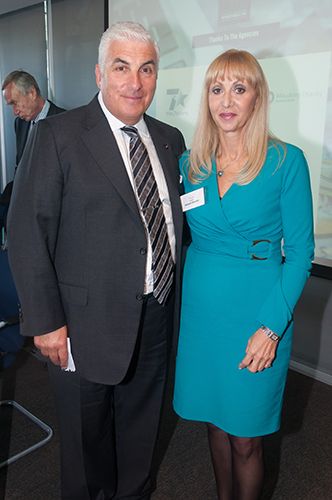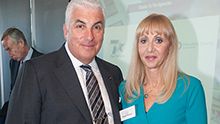…This is where the Angelus Foundation comes in. On October 16, they launched the Find Out campaign which aims to raise awareness and educate young people and parents on the dangers of ‘legal highs’. The launch began with the screening of one of the Angelus Foundation’s short films ‘Not what it says on the tin.’
Maryon Stewart is the founder of the Angelus Foundation which she set up following the loss of her 21-year-old daughter. Hester Stewart died after consuming a combination of alcohol and ‘legal high’ GBL (Gammabutyrolactone) in April 2009. ‘She was given half a dose of GBL. It turned out to be paint stripper – a clear, colourless liquid,’ Maryon Stewart explained. Hester ‘was the most unlikely person to die from drugs because she 
Mitch Winehouse set up the the Amy Winehouse Foundation after his daughter died as a result of alcohol. ‘I don’t know if Amy had of had this opportunity when she was at school, whether it would have made any difference to her. Ultimately she dealt with her drug addiction and she didn’t take drugs for going on three years before her passing’. ‘There isn’t a lot of difference, that’s why we’re so passionate about getting education into schools about alcohol and drug misuse. We want to spare other parents from going through we’ve been through. That’s our motivation.’
Together, both foundations plan to take their “unstoppable process” into schools as they campaign for drugs education to become a mandatory part of the National Curriculum, “giving young people a chance for life,” said Mitch Winehouse.
Mentor charity policy officer, Claire James, said: “In the last national survey it was found that over 60 per cent of schools are delivering drugs education once a year or less.”
Maryon Stewart revealed 49 new ‘legal highs’ were discovered last year, and 28 in the first five months of 2012. They can turn out to be stimulants, hallucinogens, anaesthetics or synthetic cannabis.
The Government are limited in banning drug substances and there are too many for them to ban immediately. Sometimes the Government banning a drug causes the creation of more drugs as the drug molecules can just be tweaked and a whole new set of drugs then appear on the market.
These substances are often sold as ‘research chemicals’ to avoid legislation and are therefore deemed ‘legal’ and can not be stopped from being getting into countries. When bought from the internet they are not labelled correctly, for example they could be labelled as plant food or baths salts so that they do not contravene the law on supply of medicines, when in when in actual fact they are not.
If these drugs are sold to young people in a wrap or a bag, it’s possible they could be a mixture of several drugs. The sellers can not be relied on to inform buyers of the facts or even know themselves.
Unfortunately these ‘legal highs’ are readily available online and over the counter at high street head shops. Students opting for a cheaper high don’t realise they are at risk of bladder shrinkage, urinating blood or death.
A survey revealed 50 per cent of young people admit to being offered legal highs, of those
a third admit to taking them and two thirds are not aware of the risks.
Louise was not a regular drug user ‘but that’s the thing, it’s normally the kids who aren’t regular drug takers or drinkers even, that just go “oh, it’s legal and it just makes you feel a bit buzzy, alright.” They could take just one and it can kill – that’s a terrifying thing.
Campaigning
Dr Owen Bowden-Jones is a consultant addiction psychiatrist and member of the Angelus Advisory Board – he founded the Club Drug Clinic in 2011. It is the UK’s largest centre specialising in treating those for the use of club drugs and ‘legal highs’. He explained how the Club Drug Clinic has had 450 referrals. The clinic has also been into clubs and made the service easily accesible through the use of QR codes.
The problem isn’t a priority for the Government but the Angelus and the Amy Winehouse foundations have lots of plans for the next year and plan to ‘make it a priority.’
The Find Out campaign will seek funding to
set up labs to further research into the issue and under the expertise of toxicologist, Dr John Ramsey. The campaign will also look to develop informative apps.
Maryon thinks young people ‘are going to be really grateful that’s there’a a resource they can go to that’s not judgemental, that just provides information.
‘We want to tailor a community for their needs so that they’ll be able to ask questions and just find out what they need to know. We’re just giving them information hoping that when they know that it’s not what it says on the tin, they will make the [right] decision.
‘If you tell them [young people] that it isn’t legal and that it could cause harm and even death, and explain all the facts, our research in schools shows that it changes their attitudes.’
Find Out More
Visit whynotfindout.org for the necessary information to help you make informed decisions about ‘legal highs’.
Follow the Angelus Foundation on Twitter, Facebook and YouTube.
Follow the Amy Winehouse Foundation on Twitter, Facebook and YouTube.


